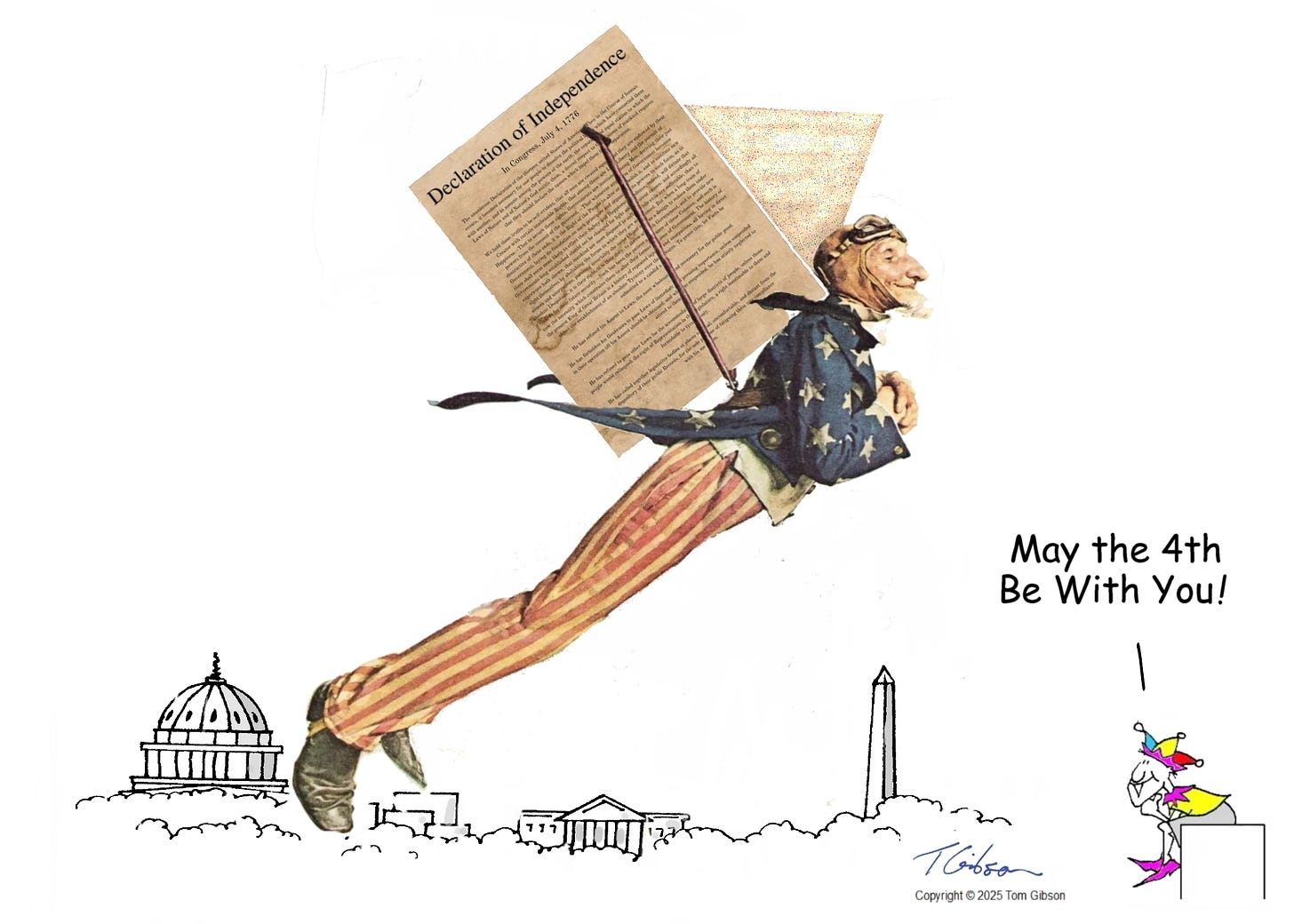Read the Declaration Independence & May the 4th Be With You
There is no better way to spend 15 minutes than reading The Declaration of Independence. It is a brilliant political document. To bad the anti-slavery phrase was cut in the final draft.
Most high school students, when invited/assigned/forced to study American history, especially when it involves reading America's formative documents, dwell on the first couple of paragraphs, skip the middle, and go strong on the close. This is certainly the case with our U.S. Constitution, and also America's Declaration of Independence.
Here are my top five Scary Thoughts regarding the DOI:
1. The Declaration of Independence is essentially a press release (ouch!).
The intended audience was the King of France, Louis XVI, and his generals. Jefferson, a total Francophile, piled on French philosophy from the Age of Enlightenment, especially Natural Rights, social contract theory, and popular sovereignty. He didn't quote Montesquieu or Rousseau, but he might as well have. Did he mean to flatter the French and pull them to support the Americans in their Revolutionary War? Was the mutual intent to further bleed the common adversary, England? Yes. And the French supported the American revolutionaries, especially at Yorktown. Most historians believe the Americans would have lost the war without the assistance of France. And oh BTW, Jefferson became Ambassador to France after the war.
2. The Declaration of Independence has no standing in the laws of America.
Though lofty, the DOI has no more standing in American Law than Lincoln's Gettysburg Address or Reagan's 1964 speech, “A Time For Choosing.” [ https://www.reaganlibrary.gov/reagans/ronald-reagan/time-choosing-speech-october-27-1964 ]. Notwithstanding, The DOI is constantly sited by politicians or the media as law or justification for laws – in the same way that a poet's inscription on the Statue of Liberty, “Give me you tired and hungry yearning to be free,” is cited by politicians, cartoonists, and media talking heads – as a driver for U.S.A.'s immigration policy. If the Declaration of Independence did have the force of law – American history would be very different. Especially, The American Civil War. Think how plainly this DOI passage reads to the political leaders and soldiers of the 19th century Southern Confederacy: “...Governments are instituted among Men, deriving their just powers from the consent of the governed, – That whenever any Form of Government becomes destructive of these ends, it is the Right of the People to alter or to abolish it, and to institute new Government...”
3. The word “self-evident,” is completely amusing.
As in, ”... We hold these truths to be self-evident, that all men are created equal...” In Washington, D.C., in the rest of America, in the rest of the world – NOTHING is self-evident! There are always at least two arguing views. The whole political-economy of Washington, the legal industry, the insurance industry, religion, marketing, consulting, sports reporting, and of course, all the American and British murder mysteries – all are based on the premise that things are NOT, and never will be, self-evident.
Like a good speech-writer – Jefferson didn't want to get bogged-down in proving anything – he wanted to slam down some Age of Enlightenment assertions. “Self-evident” is just a quick plug, a bit like the modern conversational “what not” or “stuff-like-dat,” for when a speaker/writer just wants to end a sentence and move on.
“Pursuit of Happiness,” does NOT mean “chasing fun and pleasure.”
In the 18th century, “pursuit” commonly meant “vocation” and it remains the second or third definition in Websters. And “happiness” is meant to mean "joy" or “fulfillment.” Hence the meaning of the phrase is properly understood as, "a life lived for contentment and wholeness.” Some scholars suggest it is was cover for “Property Rights,” that was more explicit in earlier drafts. But that concept might have made the French aristocracy nervous. In fact, my colleague T.C. suggests it is closer to the Aristotelian concept of Eudaimonia: “That happiness is an activity of the soul in accord with virtue – and that true happiness is to be found in living a virtuous life.”
Anti-Slavery Section Cut – It was in the final DRAFT, but cut in the final print.
Jefferson's concept was that the onerous slave trade was forced upon colonies. But oops, Jefferson was a slave-owner. Still, he condemned the slave trade and King George III's role in it. In final Philadelphia negotiations, the representatives from Georgia and South Carolina said, “no” to the anti-slavery phrase in the final edit. And the American rebels decided that a unanimous front of all 13 colonies was necessary to create the illusion of broad solidarity in America – because in actual fact, only a third of the people in Colonial America supported breaking with Britain. Here is what was cut: "He has waged cruel war against human nature itself, violating its most sacred rights of life and liberty in the persons of a distant people who never offended him, captivating & carrying them into slavery in another hemisphere or to incur miserable death in their transportation thither."
Cartoon Credit: Adapted from Norman Rockwell's 1928 Saturday Evening Post cover, “Flying Uncle Sam.”





